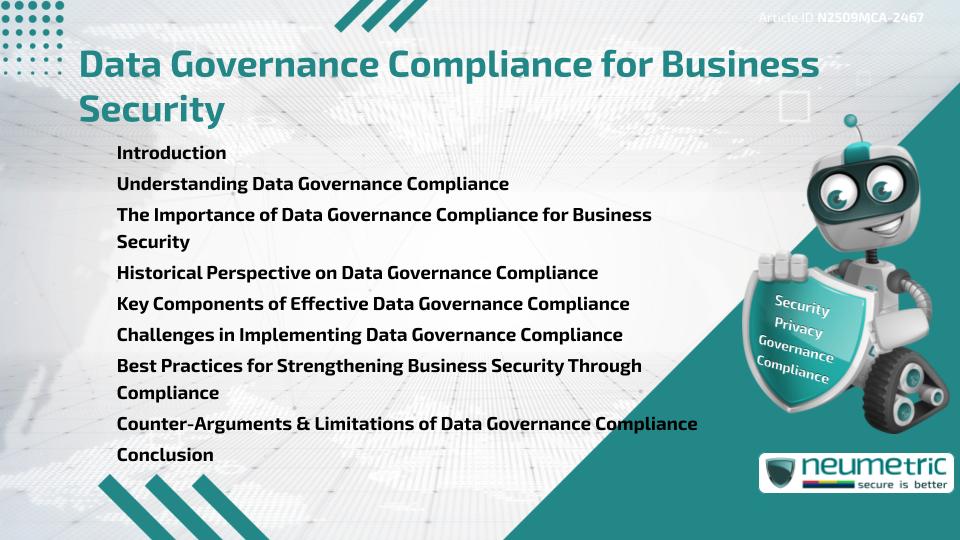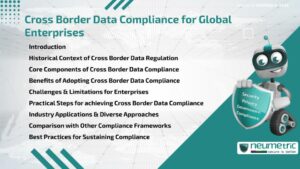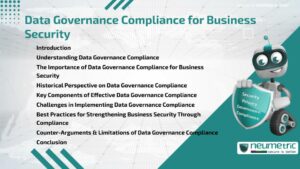Table of Contents
ToggleIntroduction
Data Governance compliance is a crucial Framework that ensures businesses manage their information responsibly, securely & ethically. It involves aligning data practices with legal, regulatory & organizational requirements to protect Sensitive Information, maintain trust & prevent security breaches. Businesses that adopt strong data Governance compliance not only avoid penalties but also build resilience against Cyber Threats, enhance operational efficiency & preserve their reputation. This article explores the significance of data Governance compliance, its history, challenges & Best Practices for ensuring business security.
Understanding Data Governance Compliance
Data Governance compliance refers to a structured approach to managing data assets in line with regulatory requirements & Industry Standards. It covers aspects like data quality, accessibility, security & usage. By implementing Policies & procedures, Organisations ensure that data is reliable, consistent & safeguarded from misuse.
For example, compliance with frameworks such as the General Data Protection Regulation [GDPR] or the Health Insurance Portability & Accountability Act [HIPAA] provides a roadmap for businesses to handle personal & Sensitive Information responsibly. More details on GDPR & HIPAA highlight the importance of compliance.
The Importance of Data Governance Compliance for Business Security
Business security depends heavily on Data Integrity & protection. Data Governance compliance helps mitigate Risks by:
- Preventing unauthorized access to Sensitive Information
- Reducing the Risk of data breaches & associated Financial losses
- Enhancing Customer confidence & trust
- Ensuring adherence to evolving regulatory landscapes
In industries like Finance, Healthcare & e-commerce, where data is the lifeblood of operations, compliance is not optional but essential.
Historical Perspective on Data Governance Compliance
The concept of data Governance compliance has evolved over the past two decades. Initially, data Governance focused on quality & accessibility. However, high-profile security breaches & stricter regulations transformed compliance into a security-critical discipline. Legislation like the Sarbanes-Oxley Act [SOX] in the early 2000s & subsequent Global Laws reinforced the need for businesses to align Governance with security.
Key Components of Effective Data Governance Compliance
Effective data Governance compliance includes:
- Policies & Standards: Establishing clear rules for data handling.
- Data Classification: Identifying & categorizing data based on sensitivity.
- Access Control: Implementing strict User access protocols.
- Monitoring & Auditing: Tracking usage & changes to detect anomalies.
- Training & Awareness: Educating staff about compliance responsibilities.
Resources such as NIST Cybersecurity Framework provide valuable guidance on building strong compliance systems.
Challenges in Implementing Data Governance Compliance
While crucial, data Governance compliance presents challenges:
- Complexity of overlapping regulations across jurisdictions
- Resistance from Employees due to perceived added workload
- High costs of compliance tools & audits
- Keeping pace with technological change & emerging Threats
These hurdles require careful planning, investment & ongoing commitment.
Best Practices for Strengthening Business Security Through Compliance
Businesses can enhance security through compliance by:
- Conducting regular Risk Assessments
- Automating compliance monitoring where possible
- Ensuring cross-departmental collaboration
- Updating Governance frameworks to reflect regulatory changes
- Using external audits for unbiased evaluations
For practical insights, Organisations can refer to ISACA’s resources & SANS Institute guidelines.
Counter-Arguments & Limitations of Data Governance Compliance
Some argue that data Governance compliance can be overly burdensome & costly, particularly for Small Businesses. Others claim that compliance does not guarantee security, as attackers may still exploit human error or sophisticated techniques. While these points are valid, compliance creates a strong foundation that significantly reduces Risk & demonstrates a business’s commitment to protecting its Stakeholders.
Conclusion
Data Governance compliance is no longer a choice but a necessity for safeguarding business security. By establishing robust Policies, addressing challenges & adopting Best Practices, Organisations can minimise Risks & foster trust.
Takeaways
- Data Governance compliance ensures security, trust & regulatory alignment.
- Historical events highlight its growing importance.
- Effective compliance includes Policies, Access Controls & monitoring.
- Challenges exist but can be mitigated with planning & resources.
- Compliance enhances resilience even if it does not guarantee absolute security.
FAQ
What is data Governance compliance?
Data Governance compliance is the practice of aligning Data Management with regulatory, legal & organisational requirements to ensure responsible handling of information.
Why is data Governance compliance important for business security?
It protects Sensitive Information, reduces the Risk of breaches & builds Customer Trust while ensuring regulatory adherence.
What are the main components of data Governance compliance?
Policies, data classification, Access Controls, monitoring systems & staff training are key components.
What challenges do businesses face in achieving data Governance compliance?
Policies, data classification, Access Controls, monitoring systems & staff training are key components.
What challenges do businesses face in achieving data Governance compliance?
Complex regulations, high costs, Employee resistance & technological changes pose significant challenges.
Does compliance guarantee full business security?
No, but it greatly reduces Risks & establishes a foundation for secure operations.
How can Small Businesses manage data Governance compliance?
They can start with simple Policies, use affordable tools & seek external guidance to balance costs & compliance.
What frameworks support data Governance compliance?
Frameworks such as GDPR, HIPAA & the NIST Cybersecurity Framework provide structure & guidance.
Need help for Security, Privacy, Governance & VAPT?
Neumetric provides organisations the necessary help to achieve their Cybersecurity, Compliance, Governance, Privacy, Certifications & Pentesting needs.
Organisations & Businesses, specifically those which provide SaaS & AI Solutions in the Fintech, BFSI & other regulated sectors, usually need a Cybersecurity Partner for meeting & maintaining the ongoing Security & Privacy needs & requirements of their Enterprise Clients & Privacy conscious Customers.
SOC 2, ISO 27001, ISO 42001, NIST, HIPAA, HECVAT, EU GDPR are some of the Frameworks that are served by Fusion – a SaaS, multimodular, multitenant, centralised, automated, Cybersecurity & Compliance Management system.
Neumetric also provides Expert Services for technical security which covers VAPT for Web Applications, APIs, iOS & Android Mobile Apps, Security Testing for AWS & other Cloud Environments & Cloud Infrastructure & other similar scopes.
Reach out to us by Email or filling out the Contact Form…





